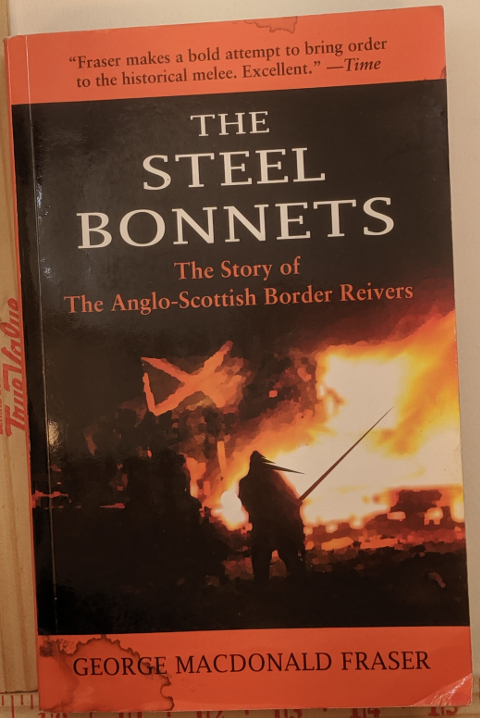Sir Walter Scott Would Approve

When Gangsters Ruled
For 400 years
The best histories are about something that matters. That is, they are not just a list of dates and events but they contain, if not a moral, at least some kind of instructive lesson that we can use. "The Steel Bonnets" by George MacDonald Fraser is such a history. In it he tells the story of the internecine conflict that plagued the Scots-English frontier from the end of the 13th century to the beginning of the 17th. His topic is not so much who killed who when but how this condition of perpetual war came to be.
Good Writers
Make for good histories
For those who are not familiar with Fraser, he was best known as the author of the Flashman series of historical novels. These are a lot of fun, and I highly recommend them, but they are not history. The settings and events are mostly based on historical events and they provide a fairly good overview of the events and personalities of the British Empire in the nineteenth century, but they are entertainment. In this work Fraser writes not just history, but an excellent history. It helps that he is a good writer. At least as important, he is a dilligent researcher who stays grounded in the documented facts. It also helps that he also knows the land and its people. This is usually what makes for a good history: a good writer, who knows the subject, is willing to do the tedious digging through dusty documents and the discipline to separate the meritorious from the meritricous.
But Good History
Needs more that just a good story
"The Steel Bonnets" is more than just a rollicking adventure. Although it is filled to bursting with tales of adventure, daring deeds, hairsbreadth escapes, castles and kings, at its heart it is a serious examination of how this one region of the British Isles became the theater of a war that never stopped. The people and the land were not markedly different from other parts of Britain. The raiding and pilliage were a net loss for all the people involved in spite of temporary victories on one side or the other. People on both sides of the border would have been wealthier and happier if they could have ended the cycle of tit for tat killing and robbery. And yet for centuries the vengence raids kept on until it became embedded in their culture. Two things are notable in Faser's catalog of raid and counter-raid. The first is that this was clan war. If an Armstrong killed a Graham, then every Graham was bound to kill any Armstrong who crossed their path regardless of whether the victim had anything to do with the original offense. The second striking feature is the prominence of "spoiling" that is wanton destruction, and arson in the course of these raids. An extortionist or blackmailer wants wealthy victims, not impoversed ones. But here vengeance was at least as important as booty as a motive.
Undying Hatred
So much easier than eternal love
This was something that mattered because even after the overt bloodshed ended, the culture it had created lived on to wreak more havoc. Two hundred years later and two thousand miles away we can see repercussions in the United States. The Hatfield and McCoy feud in the 19th century would be a familiar story to any inhabitant of the marches. And in "Huckleberry Finn", Twain describes feuding identical to those of the border marches and certainly prosecuted by the descendants of the border reivers. America's greatest writer emphasizes of how pointlessly vicious feuds in 1840's Mississippi could be a century and a half after they had been extirpated in their homeland. It is a sad fact of life that it can be much easier to start a fire than it is to put a raging colflagration out.
Good Fences
Make good neighbors
Fraser makes the point that the cause of this misery was the friction between two nations who, for centuries, could achive neither peace nor victory. History offers many other cases of chronic strife borne of warring tribes backed by impregnable hinterlands. The Sunni-Shiite struggle offers some parallels today. Each is abundantly supplied by patrons utterly beyond the reach of the other and yet neither seems interested in abandoning the quest for supremacy for cooperation, or at least co-existence. Not even the hope of a climactic battle, just a massacre here a suicide bomb there and on and on. Fraser does not say it explicity, but I think we should all know by now that the tree of vengeance bears bitter fruit.
